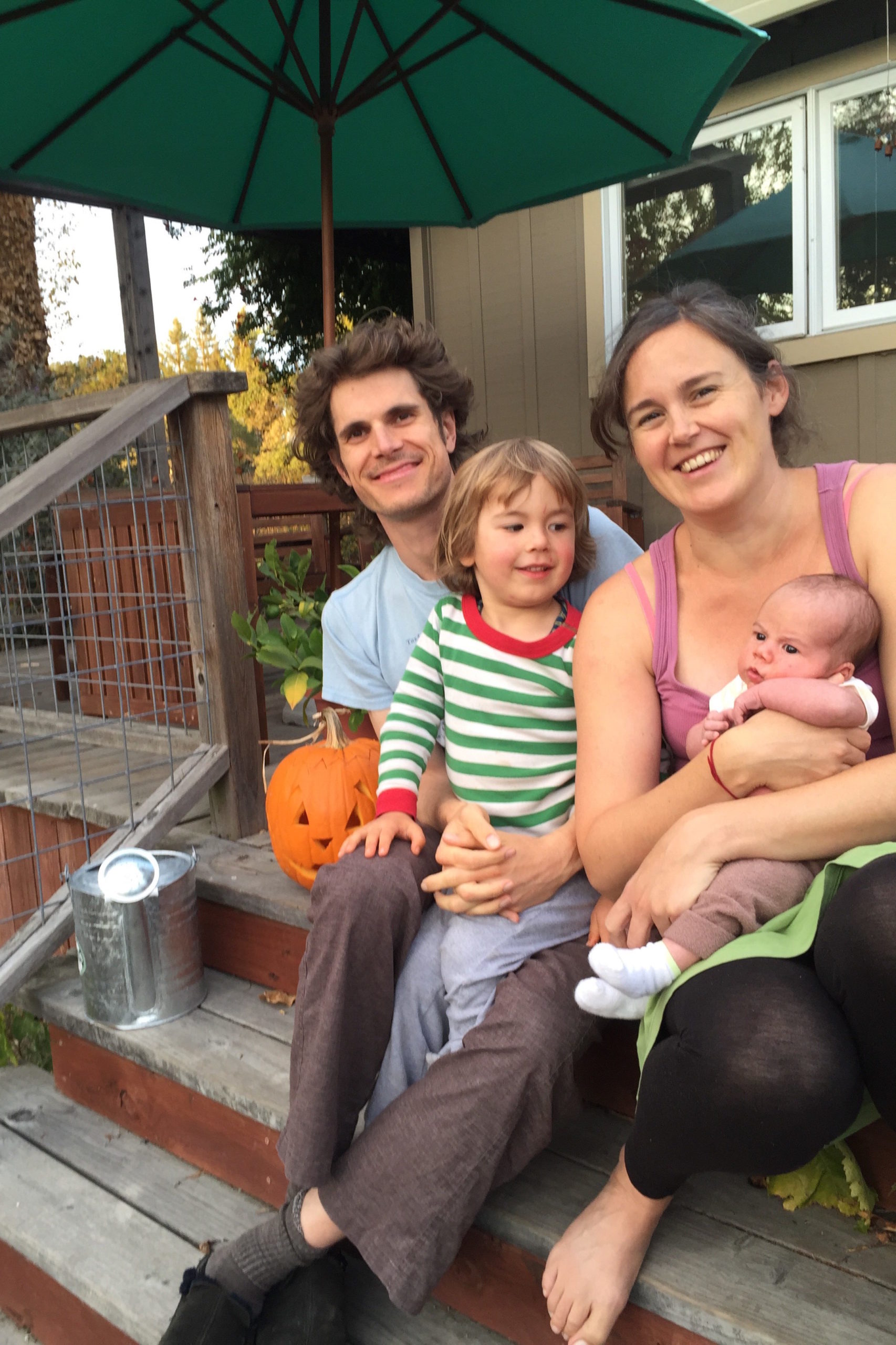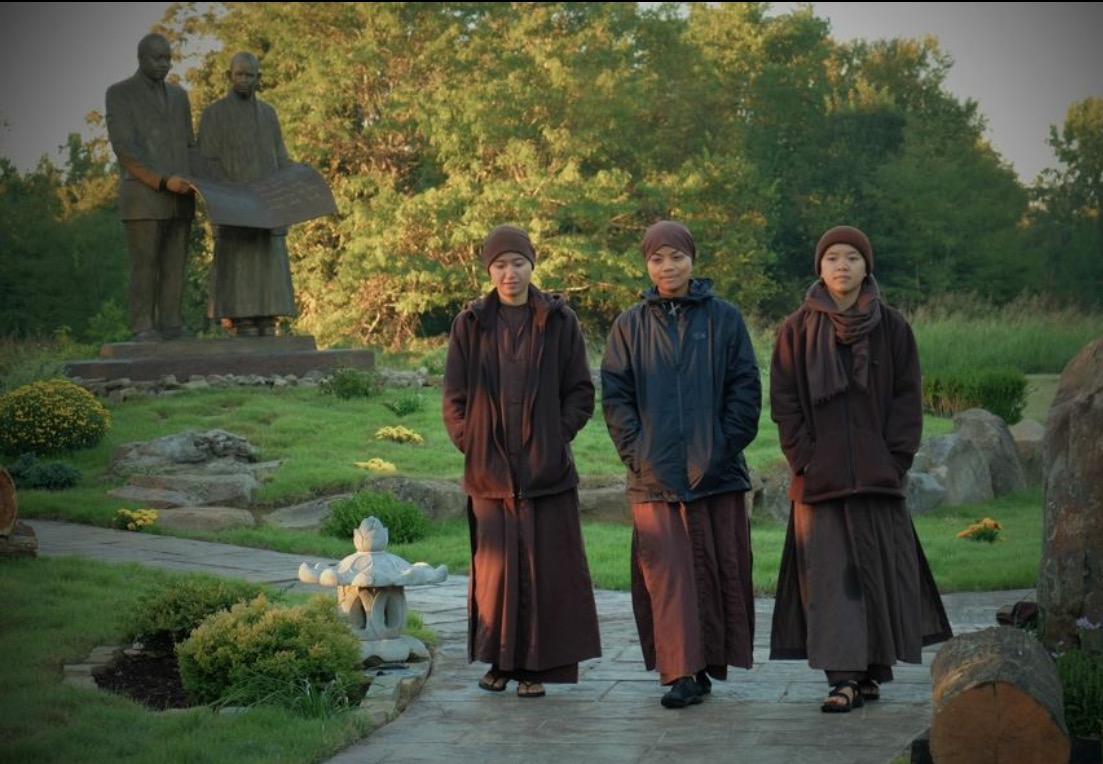Parenting as a Spiritual Practice
By Nathaniel Vose

I slowly carry two cups of tea through the sliding door onto our back deck—one green tea, the other apple cinnamon tea with oat milk. It is 6:45 a.m. and the Northern California air is still dark, dew filled, and cold. Bodhi, my four-year-old, carries a big blue blanket that we wrap around us as we sit together in a stiff and weathered wooden chair.
Parenting as a Spiritual Practice
By Nathaniel Vose

I slowly carry two cups of tea through the sliding door onto our back deck—one green tea, the other apple cinnamon tea with oat milk. It is 6:45 a.m. and the Northern California air is still dark, dew filled, and cold. Bodhi, my four-year-old, carries a big blue blanket that we wrap around us as we sit together in a stiff and weathered wooden chair. It is our morning quiet time, a happy moment for being with our hot tea and the sounds and smells of nature around us. I close my eyes and breathe slowly with a soft inner smile as I feel the weight and warmth of his ever-growing body against me.
Every once in a while his voice inches in, “Daddy, look at that line cloud,” or “Daddy, what is that sound?” It is like a mindfulness bell. I was off in thought-land, thinking about finances and how much attention the yard needed. “Hmm. I wonder?” I reply. I decide, after a few minutes, to keep my eyes open and focus on mindfulness of sight in order to allay falling asleep. My wife and I were up at 2:00 and again at 3:30 with the baby crying.
Bodhi rests peacefully with me for ten or fifteen minutes until he breaks into song, wants to read a book, or is off to explore a noise behind a nearby stump. It is a precious time. Condensed joy. My new meditation. Different from weeknights with Sangha or the hour I used to spend sitting at my altar before he was born. My altar has become the trees and the sensation of my son on my lap; my meditation is now multi-colored and shifting; my most immediate Sangha is my family or whatever happens to be right in front of me.
It has been a craggy journey for me to come to a place of accepting the shifting tides of my practice. Life over the past seven years has been one of getting intimate with transition. Moving at least once a year, starting my career, five different jobs, five different cities, marriage, two children, etc. With each step there was a rooting into myself. Amidst these times, I knew Sangha was there but its face was often changing. When parenting came, admittedly, a loneliness set in that I wasn’t expecting. My world became meaningfully limited in such a profound way, with so much direct attention being asked of me at home and at work. It was a challenge to stretch the bandwidth of my energy beyond the walls of these experiences. At times, I felt like the tiger outside of the jungle that Thay has spoken of—the one that chances danger when leaving his supportive, mindful environment. Where is my Sangha now?
A WIDENING OF MYSELF
In the first paragraphs of his book, The Miracle of Mindfulness, Thay recalls a story that exemplifies the tests of parenthood. Even forty years after publication, it remains as pertinent as ever. In that story, Thay’s friend Allen shares the insight that when he sees his time caring for his children as “his” own time, then “his” time becomes unlimited. When I first read this many years ago, I thought it was a nice “idea.” It’s taken several years of parenting and encountering bouts of anger, exhaustion, being overwhelmed, feeling like I’m losing my mind, and eventually surrendering, to have this idea become a true insight for me. It is still a necessity to find time to be on my own, but I realize more deeply than ever that even when I do this, it isn’t “my time.” It is also my family’s time. My happiness and suffering is theirs; we inter-are.
As a result, second body practice is always present. It feels more imperative for me to make each moment a mindful moment because there is always a mindfulness of my family, their needs, and a widening of myself into the environment around me. As a result, the most important question for me becomes, “Am I allowing myself to be nourished by this moment in whatever I am doing?” Even if I am wiping a bottom, or having my child scream at me or refuse to take a bath when I set strong boundaries, or simply holding suffering? When mindfulness is there, nourishment is there as well. I no longer need to see life as a problem. It’s just what is. Mindfulness helps me to respond rather than react.
A GATEWAY TO AWAKENING
Before our second son, Amias, was born, I wrote to one of my dearest mentors and asked for the support of her Sangha eye. I was facilitating a Sangha at a local church and I felt so overwhelmed and stressed with life responsibilities that I had to question my integrity. She reflected to me one of Thay’s teachings of “doing just one thing in one’s corner of the planet and allowing that to be enough.” She encouraged me to bring mindfulness, joy, and spaciousness to my family and work, and allow these to be my Sangha, as well as to cultivate the nourishment of community as much as I was able. These words were an invaluable reminder to me. What if I could throw away my ideas and accept the Sangha right in front of me? Surrender into a sense of sufficiency and recognize that abundance is already present?
Perhaps one of the most profound yet unsolicited gifts about having children is that, for a time at least, they break up your identity and push the edges of your perceptions of who you think you are or need to be. Impermanence is the only constant! I’ve been called to focus on the shifting needs of the moment and throw away my many ideas about how things should unfold. When taken as a spiritual path, having children can foster a continual letting go and opening that helps cultivate a life of peace and happiness. If I feel I am not getting “my time” to meditate in the morning because my son consistently wakes at 5:30 a.m., then I suffer. If I see it as a new way of practicing, then I have an opportunity for joy. I must then ask myself, where do I resist what is? Because it is right there that I find my Sangha. Instead of perceiving it as an obstacle that gets in the way of my practice or my self-care, I have the opportunity to experience it as a gateway to awakening.
At 1:55 a.m., I practiced walking meditation with our one-month-old, Amias, after not being able to fully assess why he was crying. Holding him as he cried, I could sense his vulnerability. Feeling tired, I could sense mine as well. As we walked, my mind reached out to all others in the world who were vulnerable, in any way, across all walks of life. I felt a warmth penetrate me. I felt a deep sense of our connection in this life experience of joy and suffering. The mindful walking and breathing soothed both Amias and me. As we walked, I discovered again the truth of Thay’s teaching. Here I was in my little corner of the universe, somehow intimately connected, and it was, in fact, more than enough.
At 1:55 a.m., I practiced walking meditation with our one-month-old, Amias, after not being able to fully assess why he was crying.
It feels more imperative for me to make each moment a mindful moment because there is always a mindfulness of my family, their needs, and a widening of myself into the environment around me.
Nathaniel Vose, True Land of Compassion, lives in Sebastopol, California, with his wife Liz Turkel, Radiant Commitment of the Heart, and their two boys, Bodhi and Amias. Together they enjoy going for walks in nature, singing, dancing, playing music, and eating popcorn on the deck.

